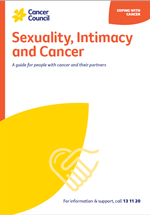- Home
- Cancer of the uterus
- Managing side effects
- Changes to sexuality and intimacy
Changes to sexuality and intimacy
Cancer of the uterus can affect your sexuality in both physical and emotional ways. Some treatments can cause dryness and narrowing of the vagina, which can make sexual penetration difficult or painful. Also, removal of the uterus, cervix and ovaries can change how you experience sexual pleasure and orgasm.
Your treatment team may advise using vaginal dilators, lubricants, moisturisers or hormone creams. It may be helpful to explore ways to orgasm (climax) without penetration or to use masturbation to see what might work for you.
Changes in intimacy and libido
You may lose interest in intimacy and sex (low libido) because of the hormonal changes of menopause, the stress of the cancer experience, the fatigue caused by treatment, and changes in how you feel about your body (body image). It may help to remember that for most people, sex is more than arousal, intercourse and orgasm. It involves feelings of intimacy and acceptance, as well as being able to give and receive love. Closeness and sharing can still be part of your relationship.
Communicating with your partner
If you have a partner and do not feel like having sexual intercourse, or if you find it uncomfortable, talk openly with them about how you’re both feeling, and take things slowly by starting with hugs or a massage rather than penetrative sex. You may both need to be patient – things often improve with time and practice.
If you have ongoing concerns about how treatment has affected your sexuality, talk to your GP or gynaecological oncologist or ask for a referral to a psychologist or sexual therapist.
For more on this, see Sexuality, intimacy and cancer.
→ READ MORE: Life after treatment
Podcast: Sex and Cancer
Listen to more of our podcast for people affected by cancer
More resources
A/Prof Orla McNally, Consultant Gynaecological Oncologist, Director Oncology/Dysplasia, Royal Women’s Hospital, Honorary Clinical Associate Professor, University of Melbourne, and Director of Gynaecology Tumour Stream, Victorian Comprehensive Cancer Centre, VIC; A/Prof Yoland Antill, Medical Oncologist, Peninsula Health, Parkville Familial Cancer Centre, Cabrini Health and Monash University, VIC; Grace Guerzoni, Consumer; Zeina Hayes, 13 11 20 Consultant, Cancer Council Victoria; Bronwyn Jennings, Gynaecology Oncology Clinical Nurse Consultant, Mater Hospital Brisbane, QLD; A/Prof Christopher Milross, Director of Mission and Radiation Oncologist, Chris O’Brien Lifehouse, NSW; Mariad O’Gorman, Clinical Psychologist, Liverpool Cancer Therapy Centre and Bankstown Cancer Centre, NSW.
View the Cancer Council NSW editorial policy.
View all publications or call 13 11 20 for free printed copies.
Need to talk?
Support services
Cancer Council Online Community
A community forum – a safe place to share stories, get tips and connect with people who understand
Support post treatment
Support and information for cancer survivors
Cancer information
Questions for your doctor about sexuality
A list of questions to help start the conversation
Staying healthy after treatment
Lifestyle changes that can help keep you in good health

